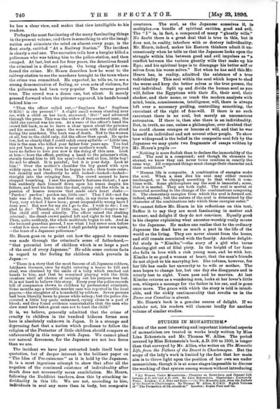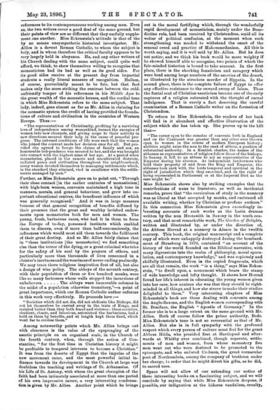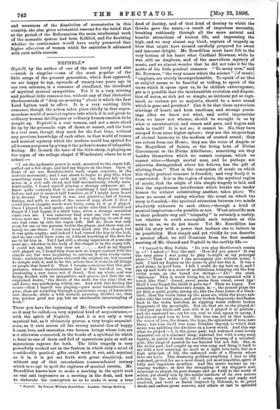STUDIES IN MONASTICISM.*
SOME of the most interesting and important historical aspects' of monasticism are treated in works lately written by Miss Lina Eckenstein and Mr. Thomas W. Allies. The period covered by Miss Eckenstein's book, A.D. 500 to 1500, is longer than that surveyed by Mr. Allies, who writes on The Monastic Life, from the Fathers of the Desert to Charlemagne. But the scope of the lady's work is limited by the fact that her maila aim is to throw light upon the position of her own sex under monasticism, though it is at some stages impossible to discuss- the working of that system among women without introducing • (L) Woman Under Monasticism : Chapters on Saint-Lore and Convent Life between A.D. 600 and A.D. 1500. By Linn Eckenstein. Cambridge : University Pres. London: C. J. Clay and Sons.—(2.) The Monastic Life, from the Father* of the Dtssrt to Charlemagne. By Thomas W. Allies, K.C.S.G. Eighth Volume, of •• The Formation of Chi iatandora." London: Kogan Paul and Co.
references to its contemporaneous working among men. Even so, the two writers cover a good deal of the same ground. but their points of view are so different that they usefully supple- ment one another. Miss Eckenstein's attitude is that of the by no means unsympathetic historical investigator. Mr. Allies is a devout Roman Catholic, to whom the subject is holy, and in whom therefore the critical faculty appears to be very largely held in abeyance. He, and any other writers of his Church dealing with the same subject, could quite well afford, we think, to show themselves willing to recognise that monasticism had its bad as well as its good sides. For its good aides receive at the present day from impartial students a really liberal measure of recognition. Hallam, of course, proverbially meant to be fair, but that fact
makes only the more striking the contrast between the cold, unfriendly temper of his references in his Middle Ages to
the great wealth of the monastic houses, and the cordial tone in which Miss Eckenstein refers to the same subject. That lady, indeed, goes almost as far as Mr. Allies in claiming for the monastic system the credit of having provided the founda- tions of culture and civilisation in the countries of Western Europe. Thus :—
" The representatives of Christianity, profiting by a surviving love of independence among womankind, turned the energies of women into new channels, and giving scope to their activity in new directions secured their help in the cause of peaceful pro- gress. The outward conditions of life were such that the woman who joined the convent made her decision once for all. But pro- vided she agreed to forego the claims of family and sex, an honourable independence was secured to her, and she was brought into contact with the highest aims of her age. At a period when monasteries, placed in the remote and uncultivated districts, radiated peace and civilisation throughout the neighbourhood, many women devoted themselves to managing settlements which, in the standard they attained, vied in excellence with the settle- ments managed by men."
Farther, as Miss Eckenstein goes on to point out, "Through their close contact [in the earlier centuries of monasticism] with high-born women, convents maintained a high tone in manners, morale, and general behaviour, and grew into im- portant educational centres, the beneficent influence of which
was generally recognised." And it was in large measure because of that general recognition of benefits diffused by their presence that the great and wealthy lavished endow- ments upon monasteries both for men and women. The young, fresh, barbarous races, who had it in them to form
the Europe of to-day, possessed instincts which enabled them to discern, even if more than half-unconsciously, the influences which would most aid them towards the fulfilment of their great destiny. And so Mr. Allies fairly claims that in "these institutions [the monasteries] we find something else than the terror of the dying, or a great criminal who tries for the safety of his soul by the prayers of others, and particularly more than thousands of lives consumed in a cloister's inertness and the weariness of never- ending psalmody. We may trace there religious inspiration first of all, but also a design of wise policy. The abbeys of the seventh century, with their population of three or five hundred monks, were like so many fortresses whose walls stopped the incursions of
unbelievers The abbeys were immovable colonies in the midst of a population otherwise transitory,"—a point of
great importance, which our Roman Catholic author enforces in this work very effectively. He proceeds here :—
" Societies which did not die, did not abdicate like Bishops, did not let themselves be carried away in the train of Kings, and resisted better than they both fraud and violence these societies, obedient, chaste, and laborious, astonished the barbarians, had a hold on them by benefits, and at length kept them fixed, which went far to civilise them."
Among noteworthy points which Mr. Allies brings out with clearness is the value of the upspringing of the ascetic principle on an organised scale, in the Church of the fourth century, when, through the action of Con- stantine, "for the first time in Christian history it might be profitable to temporal interests to became a Christian." It was from the deserts of Egypt that the impulse of the new movement came, and the most powerful initial in. fluence towards its development in the Church at large was doubtless the teaching and writings of St. Athanasius. Of his Life of St. Antony, with whom the great champion of the faith had been intimately associated at more than one period
of his own impressive career, a very interesting condensa- tion is given by Mr. Allies. Another point which he brings
out is the moral fortifying which, through the wonderfully rapid development of monasticism, mainly under the Bene- dictine rule, had been received by Christendom, amid all its welter of political confusion, at the moment when such strengthening was needed to withstand the onset of the sensual creed and practice of Mahommedanism. All this is- worth saying, and it is well said by Mr. Allies. But he does not notice, and we think his book would be more weighty if he showed himself able to recognise, two points of which the fair-minded historian is bound to take account. In the first place, there is the shocking fanaticism and savagery which were bred among large numbers of the ascetics of the desert, as illustrated by the atrocious murder of Hypatia.. In the second place, there is the complete failure of Egypt to offer any effective resistance to the onward sweep of Islam. Thus the fontal seat of Christian gsceticism became one of the early captures of a religion saturated with the thought of carnal indulgence. That is surely a fact deserving the careful examination of a Roman Catholic writer on the formation of Christendom.
To return to Miss Eckenstein, the readers of her book will find in it abundant and effective illustration of the
subject which she has taken up. She proves up to the hilt that—
"The career open to the inmates of convents both in England and on the Continent was greater than any other ever thrown open to women in the course of modern European history ; abilities might raise the nun to the rank of abbess, a position of substantial authority. In a Kentish charter, the names of the abbesses as representatives of religion follow those of the bishops. In Saxony it fell to an abbess to act as representative of the Emperor during his absence. As independent landowners who held their property of and from the King and Emperor, the abbesses took rank with the lords temporal and spiritual in the right of jurisdiction which they exercised, and in the right of being represented in Parliament or at the Imperial Diet as tho case might be."
Miss Eckenstein shows also by striking examples that the contributions of nuns to literature, as well as incidental remarks, prove that "the curriculum of study in the nunnery was as liberal as that accepted by monks, and embraced all available writing, whether by Christian or profane authors." In this connection Miss Eckenstein gives exceedingly in- teresting accounts of such works as the Latin dramas written by the nun Hrotswith in Saxony in the tenth cen- tury, and that most remarkable work, The Garden of Delights,
written and illustrated by, or under the direction of, the Abbess Herrad at a nunnery in Alsace in the twelfth century. This book, the original manuscript and a complete copy of which were unhappily destroyed during the bombard- ment of Strasburg in 1870, contained "an account of the history of the world founded on the Biblical narrative, with many digressions into the realm of philosophy, moral specu- lation, and contemporary knowledge," and was copiously and skilfully illustrated. Even is the copied fragments, which are all that remain, the work "is a thing," says Miss Ecken- stein, "to dwell upon, a monument which bears the stamp of wide knowledge and lofty thought. It shows how Herrad found her life's interest in educating the young women given.
into her care, how anxious she was that they should be right- minded in all things, and how she strove to make their studies- delightful to them." Very interesting chapters of Miss Eckenstein's book are those dealing with convents among the Anglo-Saxons, and the English women corresponding with St. Boniface, the English "Apostle of Germany." In the former she is to a large extent on the same ground with Mr. Allies. Both of course follow the prime authority, Bede. Miss Eckenstein's tone is not so reverential as that of Mr. Allies. But she is in full sympathy with the profound respect which every person of culture must feel for the greab Abbess Hilda, who presided first at Hartlepool and after- wards at Whitby over combined, though separate, settle-
ments of men and women, from whose monastery five men went out who were destined to be promoted to the episcopate, and who enlisted Cmdmon, the great vernacular
poet of Northumbria, among the company of brethren under her charge, ia order that he might direct his gifts, as he did, to sacred uses.
Space will not allow of our extending our notice of these interesting books on a fascinating subject, and we will' conclude by saying that while Mies Eckenstein deepens, if possible, our indignation at the hideous vandalism, cruelty,,
and meanness of the dissolution of monasteries in this country, she also gives substantial reasons for the belief that at the period of the Reformation the main intellectual work a the monastic system had been fulfilled, and for doubting whether its continuance would have really promoted that higher education of women which for centuries it advanced with such noble success.




































 Previous page
Previous page